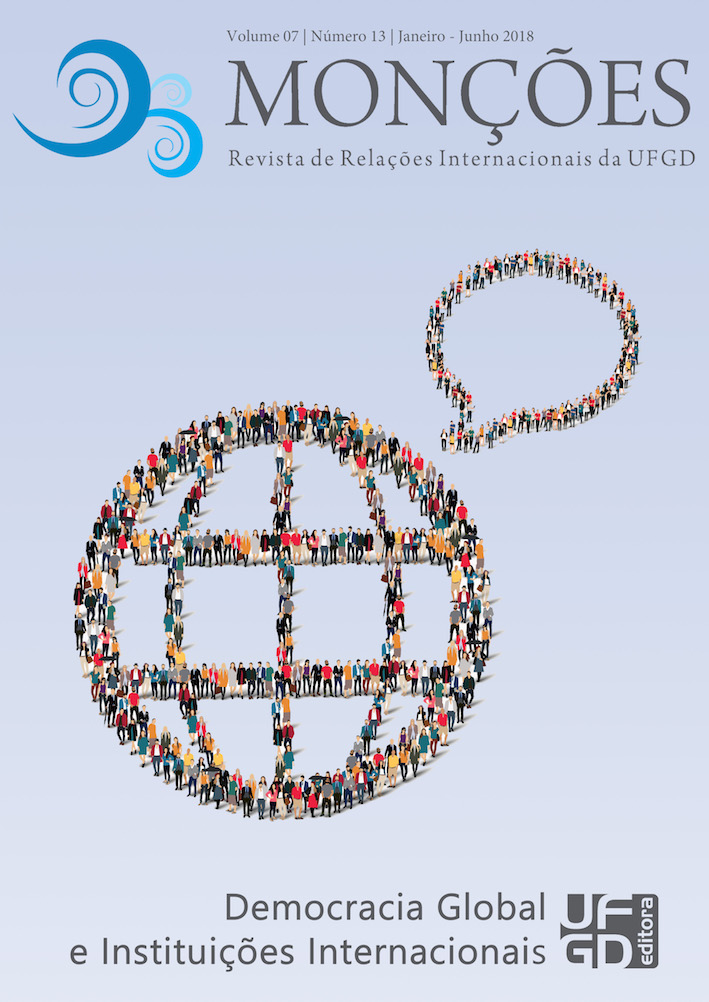Democracia global e instituições internacionais: à guisa de introdução
DOI:
https://doi.org/10.30612/rmufgd.v7i13.8737Palavras-chave:
Democracia global. Política internacional. Organizações internacionais.Resumo
A motivação do Dossiê Democracia Global e Instituições Internacionais, a estampar o presente número da Revista Monções, nasceu do seguinte diagnóstico: o debate a respeito da democratização da política internacionalé, definitivamente, algo que se impõe atualmente, não sendo facultada às discussões sobre Relações Internacionais no Brasil a opção de passar-lhe ao largo. De um lado, a despeito de todas as crises e turbulências contemporâneas, a democracia como regime de governo permanece disseminada pelo mundo. De outro lado, nunca antes foi tão aguda a consciência de suas limitações empíricas. Diante disso, o Dossiê representa um chamado à avaliação crítica e reflexiva do fenômeno da democratização da política internacional a partir de diversos ângulos analíticos. Seu objetivo central é compreender as formulações, as reformulações e os limites das vias promovidas pelos Estados, pelas instituições internacionais e outros atores não estatais para o exercício de uma gestão da governança global mais plural e aberta – e, num sentido bastante peculiar, mais “democrática” – em meio às complexidades, desigualdades e instabilidades impostas pelas condições de “anarquia estrutural”.Downloads
Referências
ABBOTT, K. e Snidal, D. (1997), “Why states act through formal international organizations?”, Journal of Conflict Resolution, 42.
ALGER, C. (2010), “Expanding Governmental Diversity in Global Governance”, Global Governance 16, pp. 59-79.
ARCHIBUGI, Daniele; ARCHIBUGI-KOENIG Mathias, Marchetti, Raffaele. Global democracy: normative and empirical perspectives. Cambridge: Cambridge University Press. 2012.
AXELROD, Robert; KEOHANE, Robert. Achieving Cooperation under Anarchy: Strategies and Institutions. World Politics.1985.
BARNETT, M. e Finnemore, M. (2004), Rules for the World. Cornell University Press.
BARNETT, M; DUVALL; R. Power in Global Governance. Cambridge University Press, 2005.
BOTCHEVA, Liliana; MARTIN, Lisa. L. Institutional Effects on State Behavior: Convergence and Divergence. International Studies Quarterly, v. 45, n. 1, p. 1-26, 2001.
BULL, H.The Anarchical Society. Londres, Macmillan. 1977
COOPER, Andrew F; CHRISTOPHER, W. Hughes; LOMBAERDE, Phillipe de. Introduction: Regionalisation and the taming of globalisation? IN: COOPER, Andrew F; CHRISTOPHER, W. Hughes; LOMBAERDE, Phillipe de. Enhancing Global Governance through Regional Integration, Oxford: Routledge. 2008.
HABERMAS, J. La Constelación Posnacional. Barcelona, Paidós. 1998
HALL, R. e Biersteker, T. The Emergence of Private Authority. Cambridge, CUP. 2002
HAWKINS, D. et al. (org.) Delegation and Agency in International Organizations. Cambridge, CUP. 2006
HELD, D. Global Covenant. Oxford, Polity Press. 2004
HOWSE, R. “The legitimacy of the World Trade Organization” in Coicaud, J.-M. e Heiskanen, V. (org.), in Coicaud, J.-M. e Heiskanen, V. (org.), The Legitimacy of International Organizations. Tóquio, UNU. 2001
KAZANCIGIL, A. “A regulação social e a governança democrática da globalização” in Milani, C. et al. (org.), Democracia e Governança Mundial. Porto Alegre, Editora da Universidade (UFRGS). 2001
KECK, M. “Governance Regimes and the Politics of Discursive Representation” in Piper, N. e Uhlin, A. (org.), Transnational Activism in Asia. Londres, Routledge. 2004.
KEOHANE, R. After Hegemony. Princeton, Princeton University Press. 1984
KEOHANE, R., Macedo, S. e Moravcsik, A., “Democracy-Enhancing Multilateralism”, International Organization, n. 63, pp. 1-31. 2009
KEOHANE, Robert O. Introduction: from interdependence and institutions to globalization and governance in KEOHANE, Robert. O. Power and Governance in a Partially Globalized World. Routledge, 2002.
KRASNER, S. (org.) International Regimes. Stanford, Stanford University. 1983
LANGLOIS, Anthony J; Soltan, Karol Edward. Global democracy and its difficulties. Routledge, 2009
MARCHETTI, Raffaele. Global Democracy: for and against – ethical theory, institutional design and social struggles. London: Routledge, 2008
MARCHETTI, R. “Modeling Transnational Politics”. Paper apresentado no 22º Congresso Mundial da Associação Internacional de Ciência Política (IPSA). Madrid, Espanha, julho de 2012.
MARKS, S. “Democracy and international governance” in Coicaud, J.-M. e Heiskanen, V. (org.), The Legitimacy of International Organizations. Tóquio, UNU, 2001
NAJEM,Tom Pierre; MARTIN; Hetherington. Good Governance In The Middle East Oil Monarchies. Routledge Curzon, London, 2003
ROSENAU, J. e Czempiel, E.-O. Governança sem Governo. Brasília, Editora UnB, 1992
RUGGIE, J. “International Regimes, Transactions, and Change: Embedded Liberalism in the Postwar Economic Order”, International Organization, 36 (2), 1982
SINGER, P. Um Só Mundo. São Paulo, Martins Fontes, 2004
WALTZ, K. Theory of International Politics. New York, McGraw Hill, 1979
WEISS, Thomas G., “Governance, Good Governance and Global Governance: Conceptual and Actual Challenges,” Third World Quarterly. 2000.
WENDT, A., Social Theory of International Relations. Cambridge, CUP. 1996
WHITMAN, Jim. The Limits of Global Governance. Routledge. 2005.
WIGHT, M. “Why is there no international theory?” in Wight, M. e Butterfield, H. (eds.), Diplomatic Investigations. London, Unwin, 1966
WOODS, N. The Globalizers: The IMF, the World Bank, and their Borrowers. Ithaca and London, Cornell University Press, 2006
YOUNG, O. Governance in World Affairs. Cornell University Press, 1999
Downloads
Publicado
Como Citar
Edição
Seção
Licença
- Os autores e autoras mantêm os direitos autorais e concedem à revista o direito de primeira publicação, com o trabalho simultaneamente licenciado sob a Creative Commons Atribuição-NãoComercial-CompartilhaIgual 3.0 Brasil. que permite o compartilhamento do trabalho com reconhecimento da autoria e publicação inicial nesta revista.
- Autores e autoras têm autorização para assumir contratos adicionais separadamente, para distribuição não-exclusiva da versão do trabalho publicada nesta revista (ex.: publicar em repositório institucional ou como capítulo de livro), com reconhecimento de autoria e publicação inicial nesta revista.
- Autores e autoras têm permissão e são estimulados a publicar e distribuir seu trabalho online (ex.: em repositórios institucionais ou na sua página pessoal) a qualquer ponto antes ou durante o processo editorial, já que isso pode gerar alterações produtivas, bem como aumentar o impacto e a citação do trabalho publicado, porém invariavelmente com o reconhecimento de autoria e publicação inicial nesta revista.


